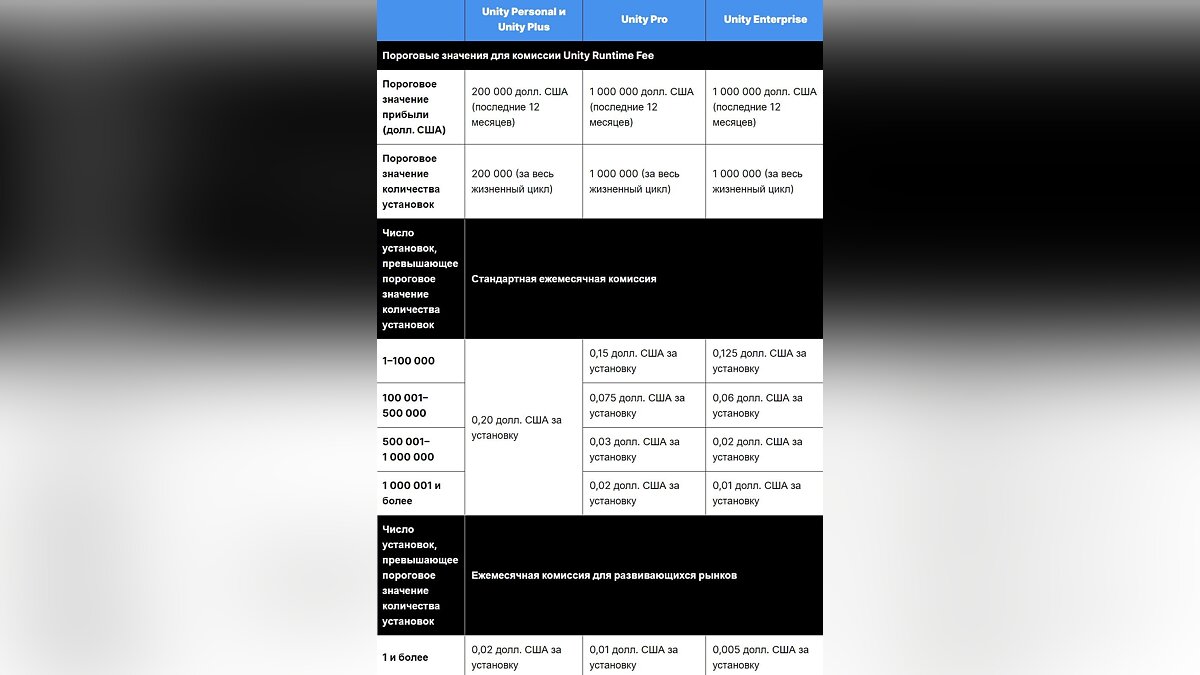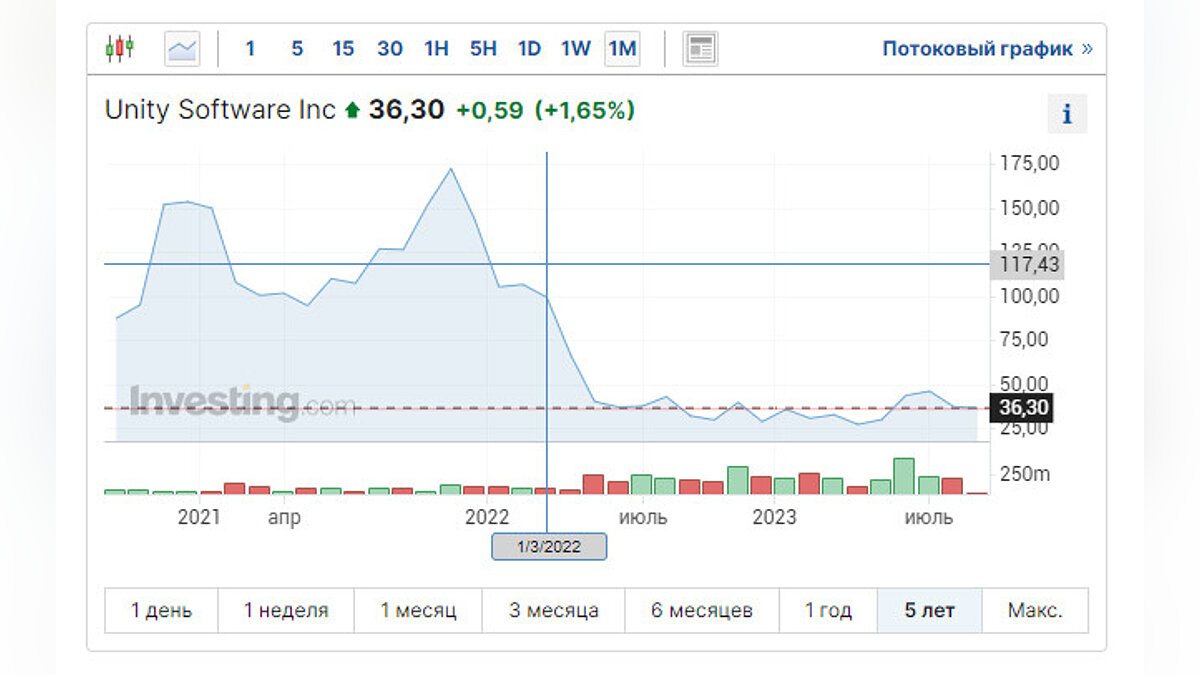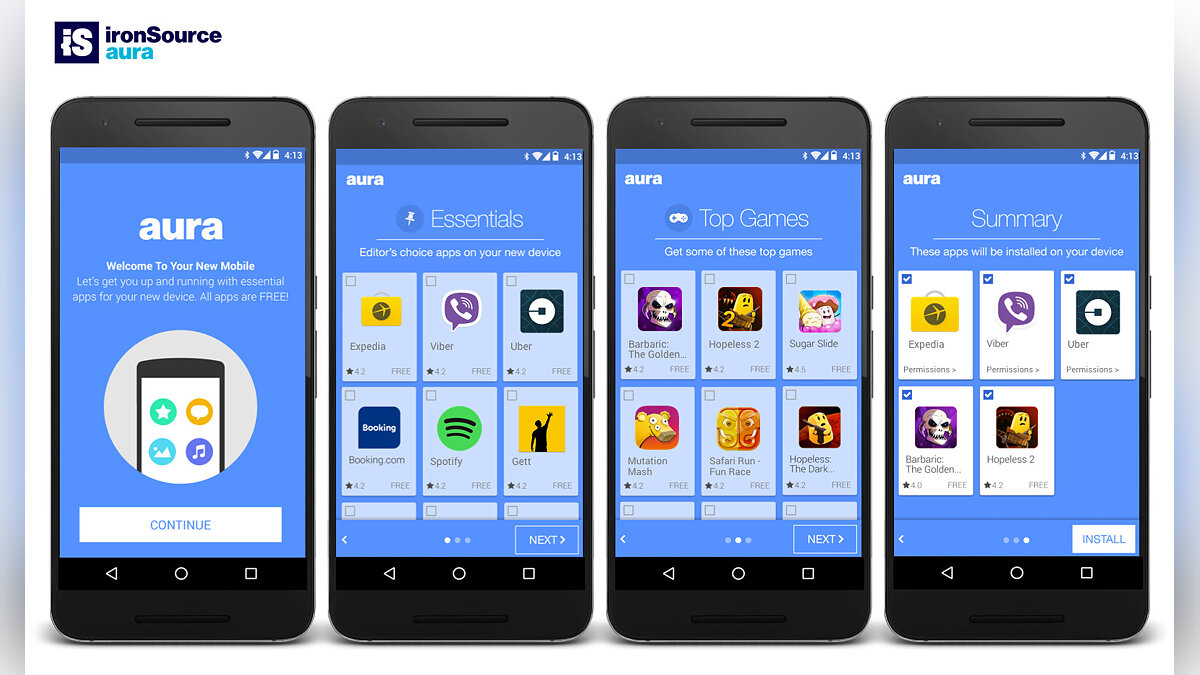On September 12, Unity, the company behind the game engine of the same name, announced a change in its business model. The bosses decided to take a commission, not as a percentage of sales, but of each installation. Unity developers, seeing the new conditions, fell into real panic and rushed to look for an alternative to the engine, or sent SOS signals to the gaming community. We tell you what consequences these ‘innovations’ can lead to and how the company responded to the flaring scandal.
Panic about initial conditions
When it comes to finance, large companies try to approach the issue very carefully, preparing the ground, thinking over every word and predicting the possible consequences of their actions behind closed doors. Unity has apparently decided not to do this.
The first message, in which the company announced the new terms of the business model, was written “dramatically”, telling the developers from the first lines that “the rules of the game have changed.”

Engine owners will introduce a new commission from January 1, 2024: Unity Runtime Fee. You will be charged if the number of installs of a game made on Unity exceeds a certain threshold. Conditions for the appearance of a steam committee:
- Games on the Unity Personal and Unity Plus rates must earn at least $200,000 in the last 12 months and receive at least 200,000 installs for the entire period;
- Games on the Unity Pro and Unity Enterprise subscriptions that earned $1 million in the last twelve months and also received at least one million installs throughout the period.
Naturally, in addition to the commission, the company also offers developers new tools, such as a free module for AI training and additional space in the cloud storage for assets. But for many developers, these conditions turned out to be unacceptable: the new “bonuses” do not cover the sharp increase in commission.

The fact is that the commission is charged not for the purchase of the project, but for downloading it. In addition, the original version of the changes charged a commission for each download. That is, if a user downloads the game, deletes it, and then downloads it again, Unity charges a commission twice.
Developer panic and weaknesses in the new rules
Almost immediately after the news was published, many developers began to criticize the company’s new policy en masse. Largely for the reason that the original conditions did not take into account modern market characteristics.

First of all, Unity owners didn’t think about what would happen to the game on Game Pass. Games from this service can be downloaded and installed by more than 25 million players. At the same time, developers often receive a fixed fee for posting a game on the Microsoft service, which means that each download leads to a decrease in revenue. Aggro Krab Studio increased this issue and stated that if the terms of the committee do not change, they will be forced to look for a replacement for Unity.
Makers Cult of the Lamb also did not stand aside and stated that if new conditions are introduced, the company will begin to study a new engine, which means the inevitable transfer of future studio projects.
IN same situation the authors turned out to be too Kill the spire. They have been working on a new project in Unity for two years now and will be forced to move the game if the situation does not change. According to them, the company’s decision not only hurts all developers and the indie sector in particular, but also undermines trust between game makers and the company.

Finally, a striking example of the imperfection of Unity’s new financial model was the developer of a small indie project The last hero of Nostalgaia. According to himIf the changes take effect, he will owe the company more than he has earned in his entire career. He is also considering switching to Unreal Engine.
Authors Among us, developer The last night, Creator shooter DUSK – all these people are also speaking out against the new model. A group of Unity game makers I’ve already started cooking class action lawsuit against the company.
Do you play indie projects?
There are many controversial points in the new rules – in addition to installing games through a subscription (Game Pass), developers do not understand how it will work with web games that do not require installation. Will every launch be considered an “installation”?
“Cheating” installations to put the developer out of business, trial versions of games, early access, streaming games, games created for charity purposes – Unity was in no hurry to explain all these points for a long time. And during this period, developers’ dissatisfaction grew.
Reaction from the public and company employees
Unfortunately, simple messages on X (Twitter) did not solve the problem. The company had to close two offices and cancel a planned meeting with developers. All because Unity employees started receiving physical threats. During this meeting, the head of Unity wanted to talk to employees about the current situation.

The employees themselves are not happy with what is happening. Employees tried to reason with management and resisted such changes. The situation with the commission was commented on by Jono Forbes, a former employee who worked for the company for seven years.
According to himMany colleagues were against the upcoming changes and tried to convince management. They raised issues that the developer community is now talking about, and management promised them answers. But word of the change in circumstances came out without warning.

Jono promises more layoffs; employees who do not like the new direction of the company’s development will also leave. We may soon find out how many Unity employees have left the company due to current events.
Preconditions for drastic changes
Unity’s problems started a long time ago. This is at least evident from the fact that the company’s top executives – John Riccitiello and Tomer Bar-Zeev – are gradually losing their shares.
As CEO of the company, Riccitiello sold 2,000 shares on September 6, a few days before the scandalous announcement. However, in 2023 he sold more than 50,000 shares and bought none.

Tomer Bar-Zeev, the company’s director of development, and board member Shlomo Dovrat, sold 37,000 and 68,000 shares respectively, a few weeks before news of changes to the financial model emerged.
In addition, the company has laid off more than 600 people by 2023 and reduced the number of offices from 58 to 30.

By the way, against the background of the new policy, another event becomes more understandable. In July 2022, Unity and ironSource announced their merger. ironSource is known as a manufacturer of various software that installs unobtrusive utilities on the system. The products were so loved by users that Windows Defender started blocking the installation of InstallCore, the company’s software.

Perhaps it is thanks to the developments of ironSource that Unity plans to solve one of the critical problems of the new policy: the mechanism for tracking game installations.
Unity itself explained the merger by saying that the companies’ customers “will be able to benefit from a closer connection between the Unity game engine and the advertising network, as well as the ironSource application business platform.”
It seems all is not lost yet
Albeit with some delay, the company is starting to bounce back a bit. And while Unity is far from giving up on the new terms, Unity has decided to bring some clarity to the mechanism of the new committee.
IN in his message in X, the company assures developers that “the changes will not impact 90% of customers.” Unity also announced that the fees will only apply to installations completed after January 1, 2024.

The reinstallation fee has been waived. However, the initial installation on a different platform is still taken into account. The intention is that fraudulent “cheats” aimed at bankrupting the developer will be handled privately.
No commission is charged on trial, demo and developer versions. But early access games didn’t fall into this category. Web games and streaming games also don’t count towards your install count. Finally, games released via “subscription services” are also not counted in the statistics.

In response to this explanation, the company was asked a rather logical question:
If you can actually detect fake installations (piracy), why can’t you prevent it in advance?
Such ‘explanations’ are not enough for developers; many studios are apparently ready to go all out. According to Mobilegamer.biz, at least 16 mobile game studios have disabled Unity and ironSource monetization in protest and are calling on other developers to do the same.

What’s happening with Unity worries a lot of people. The company’s engine is used by tens of thousands of developers around the world. And even if the majority of creators are not affected by changes in financial policies, a series of layoffs, declining shares and reputational losses will affect the quality of the engine, its updates and the possible development of tools in the future.
What do you think of the current situation? Do you think the new changes will hit developers hard or is this unfounded panic?
Do you think it is important on which engine the game was made?
Source: VG Times
Christina Moncayo is a contributing writer for “Social Bites”. Her focus is on the gaming industry and she provides in-depth coverage of the latest news and trends in the world of gaming.

